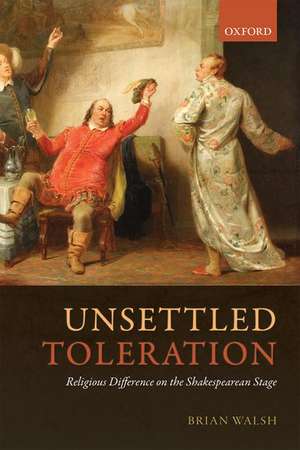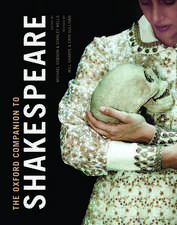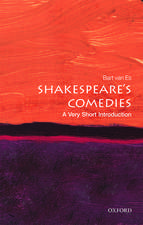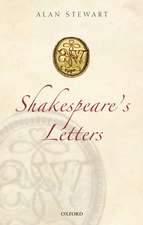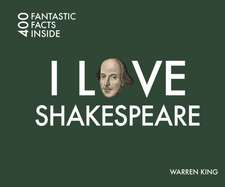Unsettled Toleration: Religious Difference on the Shakespearean Stage
Autor Brian Walshen Limba Engleză Hardback – 24 mar 2016
Preț: 597.80 lei
Preț vechi: 858.21 lei
-30% Nou
Puncte Express: 897
Preț estimativ în valută:
114.38€ • 119.44$ • 94.46£
114.38€ • 119.44$ • 94.46£
Carte tipărită la comandă
Livrare economică 04-10 aprilie
Preluare comenzi: 021 569.72.76
Specificații
ISBN-13: 9780198754435
ISBN-10: 0198754434
Pagini: 230
Dimensiuni: 162 x 234 x 21 mm
Greutate: 0.49 kg
Editura: OUP OXFORD
Colecția OUP Oxford
Locul publicării:Oxford, United Kingdom
ISBN-10: 0198754434
Pagini: 230
Dimensiuni: 162 x 234 x 21 mm
Greutate: 0.49 kg
Editura: OUP OXFORD
Colecția OUP Oxford
Locul publicării:Oxford, United Kingdom
Recenzii
I enjoyed the book and the considerable amount of detailed interpretation.
Walsh's study offers new perspectives on both familiar and unfamiliar texts... he successfully indicates the extent to which artistic licence could explore a more flexible and accommodating response to confessional differences than was possibleor permissible in a more public political context.
Walsh's excellent book recognizes fine distinctions often overlooked within presentations of religious discourse. It reminds us that the Reformation was an unsettled period that both marginalized and integrated competing theological beliefs and practices." --Richard Finkelstein, Modern Philology
... takes a fresh look at the well-established notion that Renaissance plays tend to be religiously polyvocal rather than expressing a single theological or confessional stance ... What makes his book important is the way it expands the critical vocabulary we use to talk about theater and religion.
Walsh is equally confident working inside and outside the canon, showing the subtlety in plays that are seldom read or taught, and not afraid to discuss them at length.
Following in the footsteps of Jeffrey Shoulson and David Scott Kastan, Walsh undertakes an important consideration of Shakespeare and religion.
The title of Brian Walshs book, Unsettled Toleration, seems especially resonant in the context of contemporary anxieties about religious difference. Focusing on an intra-Christian conflict between dominant and minority believers, Walshs thesis re-engages with the relationships between faiths in early modern drama ... Walsh analyses the instrumental role that the theatre played to create, enlarge, and sustain an openended public conversation on the vicissitudes of getting along in a sectarian world. Walshs argument is not that Shakespeares theatre produced liberal versions of religious pluralism but rather that the stage hatched imagined scenarios of confessional conflict.
Walsh's study offers new perspectives on both familiar and unfamiliar texts... he successfully indicates the extent to which artistic licence could explore a more flexible and accommodating response to confessional differences than was possibleor permissible in a more public political context.
Walsh's excellent book recognizes fine distinctions often overlooked within presentations of religious discourse. It reminds us that the Reformation was an unsettled period that both marginalized and integrated competing theological beliefs and practices." --Richard Finkelstein, Modern Philology
... takes a fresh look at the well-established notion that Renaissance plays tend to be religiously polyvocal rather than expressing a single theological or confessional stance ... What makes his book important is the way it expands the critical vocabulary we use to talk about theater and religion.
Walsh is equally confident working inside and outside the canon, showing the subtlety in plays that are seldom read or taught, and not afraid to discuss them at length.
Following in the footsteps of Jeffrey Shoulson and David Scott Kastan, Walsh undertakes an important consideration of Shakespeare and religion.
The title of Brian Walshs book, Unsettled Toleration, seems especially resonant in the context of contemporary anxieties about religious difference. Focusing on an intra-Christian conflict between dominant and minority believers, Walshs thesis re-engages with the relationships between faiths in early modern drama ... Walsh analyses the instrumental role that the theatre played to create, enlarge, and sustain an openended public conversation on the vicissitudes of getting along in a sectarian world. Walshs argument is not that Shakespeares theatre produced liberal versions of religious pluralism but rather that the stage hatched imagined scenarios of confessional conflict.
Notă biografică
Brian Walsh has taught at Rutgers, the University of Illinois, and Yale University. He is the author of Shakespeare, The Queen's Men, and The Elizabethan Performance of History (Cambridge University Press, 2009) as well as several articles and book chapters on Elizabethan and Jacobean drama. He has also edited a collection of essays on The Revenger's Tragedy for Bloomsbury Publishing.
